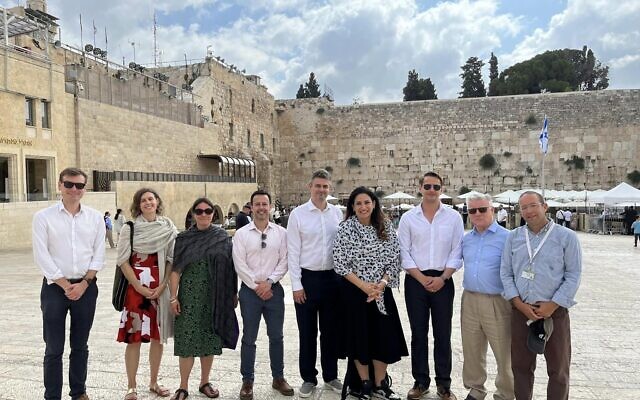OPINION: Could the Good Friday agreement be a model for Israeli-Palestinian peace?
Ahead of 'much needed change and new thinking' in Israel, Labour Friends of Israel today sets out a new framework for the long road ahead
The catastrophic Israel-Hamas war is an irreversible turning point in the Israeli-Palestinian conflict. The diplomatic priority for the international community in the short term is the massive humanitarian needs of Gazans and the effort to return hostages to Israel.
But beyond those challenges, we need to focus on ensuring these horrifying events can be used to create a new and more hopeful future for all.
In the end there is the same challenge: two groups with strong national claims in the same small land. A Palestinian state in the Gaza Strip and West Bank, alongside Israel, remains the best way to reconcile these goals in the long term.
But renewed final status negotiations are not realistic any time soon. There is no political leader on either side with the will or ability to compromise on the most sensitive issues.
So how can the changed reality be the basis for a new framework for peace? In a new policy paper LFI is publishing today, A Post-war Diplomatic Agenda for Israeli-Palestinian Peace, I set out some initial thoughts.
The starting point is to recognise that this war will bring seismic political changes that may unlock new opportunities. If Israel succeeds in defeating Hamas militarily this will strike a blow to the Iran-led axis’s violent means, religious ideology and absolutist goals.
Meanwhile a political earthquake is coming in Israel. Support for Benjamin Netanyahu and his coalition is collapsing. Centrist and pragmatic Benny Gantz is now Israel’s most popular political leader. A new government, including our friends in the Israeli Labor party and its leader, Merav Michaeli, can help bring about much-needed change and new thinking in place of the discredited Netanyahu project.

With an eye on these changes, we should be focused on building an agenda that moderate Israelis and Palestinians could agree on: advancing legitimate Palestinian rights whilst permanently marginalising Hamas and Islamic Jihad and rolling back the influence of Iran. There are four steps that if pursued in parallel by a coalition of western and Arab states – working with Israel and the PA – can advance that agenda.
First, all these actors should reaffirm the two-state vision, whilst agreeing practical steps to restore the credibility of the PA that do not require Israel to compromise on security. These would include new investment and aid packages; gradually expanding PA territory in the West Bank; freezing construction in isolated settlements; and upgrading international recognition of Palestinian sovereignty in coordination with Israel. These must be accompanied by a programme of radical PA reform, reduced corruption, and restored faith for Palestinians in a political process.
A majority of Israelis might be ready to accept these if presented as part of strategy to permanently exclude Hamas, and if they come in parallel with a second step: normalisation with Saudi Arabia. This move has transformational potential for Israel’s economy, security, and regional integration. It must also be packaged with clear benefits for Palestinians, so that they have reason to see Arab-Israeli normalisation as an opportunity rather than a threat.
The third element is a plan for the Gaza Strip, which needs its own Marshall Plan. Ultimately, only Palestinian leaders can secure legitimacy from the local population to govern Gaza and lead reconstruction. But the PA is unpopular, and its leaders unwilling to “return to Gaza on an Israeli tank.” Establishing a post-Hamas administration is therefore a complex challenge to be solved between Israel, the PA, Egypt, and Arab and western supporters. It may involve a PA-backed but autonomous Palestinian technocratic leadership, reinforced by an Arab-led international mission.
A fourth element, tied to the other three, is investing in a culture of peace. Incitement within the Palestinian Authority must now be addressed with seriousness and urgency, with no more payments to terrorists. The Israeli far right must also be marginalised and violence by extremist settlers stopped.
In place of a culture of hate, it is time to invest in an International Fund for Israeli-Palestinian Peace, modelled on the International Fund for Ireland, which laid the ground for the Good Friday Agreement. While this may seem distant now, we should not lose sight of positive examples and remember that the International Fund for Ireland was itself established during the darkest days of The Troubles in the mid-1980s. The Abraham Accords have themselves showed how a language of kinship between Jews and Arabs could reinforce new political ties.
It has been said countless times that the status quo was not sustainable. Now it has collapsed and something new must be born. While hard to conceive now, this conflict may open new vistas for peace.
However, it will be impossible for Israelis and Palestinians, even those with the will and vision, to act without intensive international diplomacy and support. The UK, with US, European, and Arab allies, must bring a realistic yet ambitious vision for a post-war diplomatic agenda to the table.
- Michael Rubin, director, Labour Friends of Israel

Thank you for helping to make Jewish News the leading source of news and opinion for the UK Jewish community. Today we're asking for your invaluable help to continue putting our community first in everything we do.
For as little as £5 a month you can help sustain the vital work we do in celebrating and standing up for Jewish life in Britain.
Jewish News holds our community together and keeps us connected. Like a synagogue, it’s where people turn to feel part of something bigger. It also proudly shows the rest of Britain the vibrancy and rich culture of modern Jewish life.
You can make a quick and easy one-off or monthly contribution of £5, £10, £20 or any other sum you’re comfortable with.
100% of your donation will help us continue celebrating our community, in all its dynamic diversity...
Engaging
Being a community platform means so much more than producing a newspaper and website. One of our proudest roles is media partnering with our invaluable charities to amplify the outstanding work they do to help us all.
Celebrating
There’s no shortage of oys in the world but Jewish News takes every opportunity to celebrate the joys too, through projects like Night of Heroes, 40 Under 40 and other compelling countdowns that make the community kvell with pride.
Pioneering
In the first collaboration between media outlets from different faiths, Jewish News worked with British Muslim TV and Church Times to produce a list of young activists leading the way on interfaith understanding.
Campaigning
Royal Mail issued a stamp honouring Holocaust hero Sir Nicholas Winton after a Jewish News campaign attracted more than 100,000 backers. Jewish Newsalso produces special editions of the paper highlighting pressing issues including mental health and Holocaust remembrance.
Easy access
In an age when news is readily accessible, Jewish News provides high-quality content free online and offline, removing any financial barriers to connecting people.
Voice of our community to wider society
The Jewish News team regularly appears on TV, radio and on the pages of the national press to comment on stories about the Jewish community. Easy access to the paper on the streets of London also means Jewish News provides an invaluable window into the community for the country at large.
We hope you agree all this is worth preserving.






















